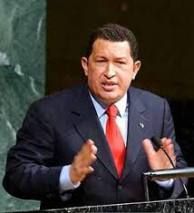 Popular Venezuelan President Hugo Chavez succumbed to cancer today in a hospital in Caracas ending his 14 years as the leader of the oil rich South American country.
Popular Venezuelan President Hugo Chavez succumbed to cancer today in a hospital in Caracas ending his 14 years as the leader of the oil rich South American country.
The flamboyant 58-year-old had undergone four operations in Cuba for a cancer that was first detected in his pelvic region in mid-2011. His last surgery was on December 11 and he had not been seen in public since. [..]
Chavez easily won a new six-year term at an election in October and his death will devastate millions of supporters who adored his charismatic style, anti-U.S. rhetoric and oil-financed policies that brought subsidized food and free health clinics to long-neglected slums.
Pres. Chavez was certainly controversial but it was through his economic and social policies that Venezuela reduced the poverty level from a low of 55.44% in 1998 to 26 percent at the end of 2008. Extreme poverty fell by 72%. He increased access to health care and education. In 2003, he made food security a priority by opening a nation wide chain of supermarkets and setting price ceilings for basic staple foods.
Pres. Chavez’ human rights record was somewhat mixed:
In the 1999 Venezuelan constitution, 116 of 300 articles were concerned with human rights; these included increased protections for indigenous peoples and women, and established the rights of the public to education, housing, healthcare, and food. It called for dramatic democratic reforms such as ability to recall politicians from office by popular referendum, increased requirements for government transparency, and numerous other requirements to increase localized, participatory democracy, in favor of centralized administration. It gave citizens the right to timely and impartial information, community access to media, and a right to participate in acts of civil disobedience.
However, as recently as 2010, Amnesty International has criticized the Chávez administration for targeting critics following several politically motivated arrests. Freedom House lists Venezuela as being “partly free” in its 2011 Freedom in the World annual report, noting a recent decline in civil liberties. A 2010 Organization of American States report found concerns with freedom of expression, human rights abuses, authoritarianism, press freedom, threats to democracy, as well as erosion of separation of powers, the economic infrastructure and ability of the president to appoint judges to federal courts.
Born Hugo Rafael Chávez Frías into a working-class family in Sabaneta, Barinas, he is survived by two ex-wives, Nancy Colmenares and Marisabel Rodríguez, and four children – Hugo Rafael, María Gabriela and Rosa Virginia by his first wife and Rosinés by his second.
Blessed Be. The Wheel Turns

Recent Comments